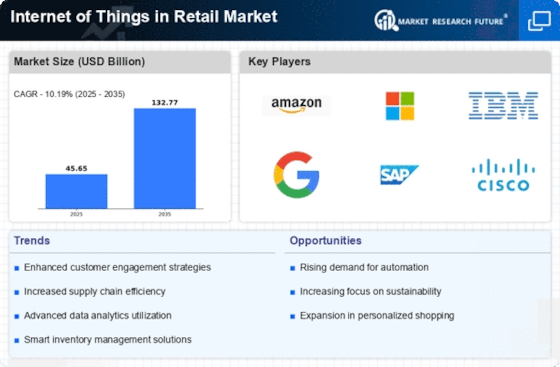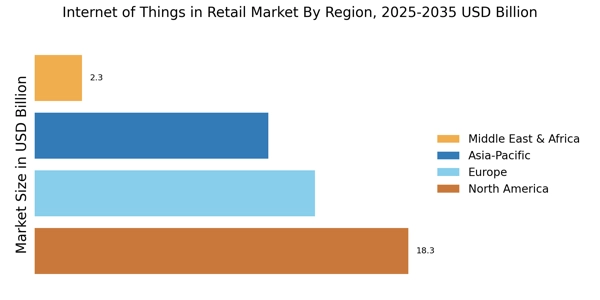Supply Chain Optimization
Supply chain management is a critical component of the Internet of Things in Retail Market. IoT technologies facilitate real-time tracking of goods, enabling retailers to monitor inventory levels and streamline logistics. This optimization can lead to reduced operational costs and improved delivery times. According to recent estimates, IoT-enabled supply chain solutions can reduce logistics costs by approximately 15%. As retailers seek to enhance efficiency and responsiveness, the integration of IoT in supply chain processes is expected to become more prevalent, thereby transforming the Internet of Things in Retail Market.
Enhanced Security Measures
Security concerns are paramount in the Internet of Things in Retail Market, particularly as retailers adopt more connected devices. IoT technologies can enhance security through real-time monitoring and automated alerts for suspicious activities. Retailers are increasingly investing in IoT security solutions to protect sensitive customer data and prevent theft. A report indicates that retailers implementing IoT security measures can reduce theft-related losses by up to 25%. As the threat landscape evolves, the focus on security within the Internet of Things in Retail Market is expected to intensify, driving further innovation.
Data-Driven Decision Making
The Internet of Things in Retail Market is increasingly driven by the ability to harness data for informed decision-making. Retailers are leveraging IoT devices to collect real-time data on customer behavior, inventory levels, and sales trends. This data enables retailers to optimize their operations, enhance customer experiences, and tailor marketing strategies. For instance, a study indicates that retailers utilizing IoT analytics can improve their inventory turnover rates by up to 30%. As data becomes more accessible, the reliance on data-driven insights is likely to grow, positioning the Internet of Things in Retail Market as a pivotal player in shaping retail strategies.
Integration of Artificial Intelligence
The integration of artificial intelligence (AI) with IoT technologies is emerging as a transformative driver in the Internet of Things in Retail Market. AI algorithms can analyze vast amounts of data collected from IoT devices, enabling predictive analytics and smarter inventory management. This synergy allows retailers to anticipate customer needs and optimize stock levels accordingly. Current projections suggest that the combination of AI and IoT could enhance operational efficiency by up to 40%. As retailers increasingly adopt AI-driven IoT solutions, the Internet of Things in Retail Market is poised for substantial growth.
Personalization and Customer Engagement
Personalization is a key driver in the Internet of Things in Retail Market, as retailers strive to create tailored shopping experiences. IoT devices, such as smart shelves and connected beacons, allow retailers to gather insights into customer preferences and behaviors. This data can be utilized to deliver personalized promotions and recommendations, enhancing customer engagement. Research suggests that personalized marketing can increase customer retention rates by up to 20%. As the demand for personalized experiences continues to rise, the Internet of Things in Retail Market is likely to evolve to meet these expectations.

















